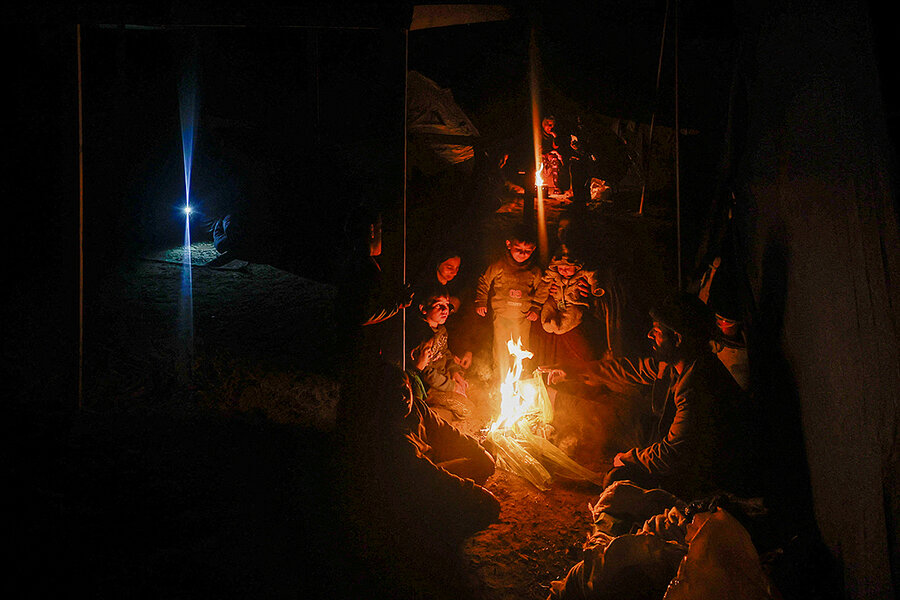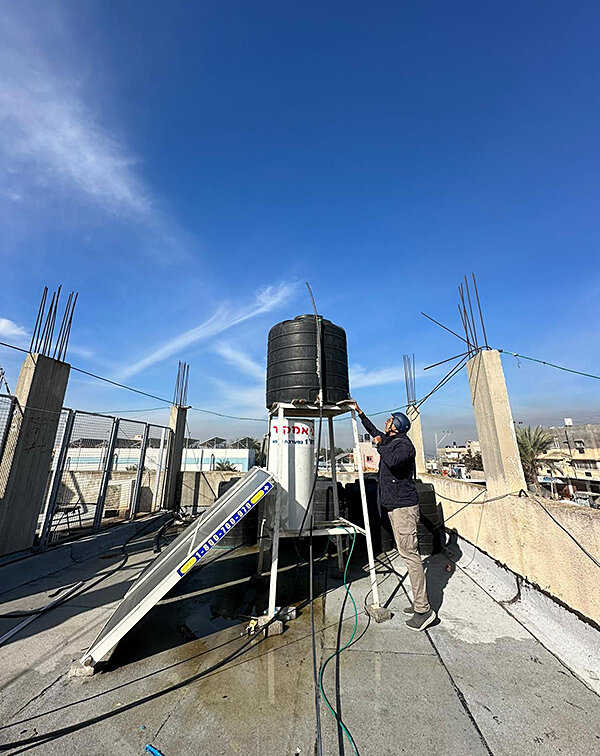In wartime Gaza, a complicating burden: Communication blackouts
Loading...
| Deir al-Balah, Gaza Strip; and Amman, Jordan
Amid the chaos, destruction, and terror of war, communication blackouts have been an extra and complicating challenge for Palestinians in Gaza. Widespread phone and internet outages have cut Gaza residents off from the outside world and each other, led ambulances to get lost, and left anxious families wondering for days whether relatives were alive or dead.
Communication blackouts have dogged Gaza since Oct. 27, as fuel shortages hit telecom provider Paltel and Israel repeatedly struck cell towers and underground networks. According to Paltel, nine enclavewide blackouts of 24 hours or longer have occurred since the start of the war. But their frequency is increasing, including a two-day outage beginning Dec. 27.
Why We Wrote This
A story focused onCommunications are a basic societal need, especially in times of stress. In wartime Gaza, where phone and internet service has been besieged, better-equipped journalists say they have to balance their professional duties with helping people to cope.
Gaza journalists, by pooling their resources, remain able to use a satellite uplink to broadcast live feeds in front of Al-Aqsa Hospital in Deir al-Balah. Elsewhere in Gaza, video, photographs, and text reports must be uploaded by phone.
One day last week, Bassem Khalaf, a veteran journalist for the Al Araby TV network, had only hours to upload his latest report. With his deadline looming, he raced to a rooftop at the edge of the Al-Aqsa complex in hopes of a signal.
“We have returned to the stone ages, but with iPhones,” he says.
Signaling a new phase of its war against Hamas, Israel has ordered a drawdown of its troop deployment in the northern Gaza Strip. But there was little clarity over when the conflict might end for Gaza Palestinians increasingly left in the dark.
In a statement Monday, the Israeli army said it would begin a series of more targeted strikes against Hamas, and that the withdrawal of several brigades was meant “to gather strength for upcoming activities in the next year, as the fighting will persist.”
Yet even as it embarked on the demobilization, Israel maintained its intense bombing in central and southern Gaza Tuesday. Palestinian health officials said another 200 people were killed, pushing the death toll in Gaza past 22,000 since the war began Oct. 7 with a Hamas attack that killed more than 1,200 people in Israel.
Why We Wrote This
A story focused onCommunications are a basic societal need, especially in times of stress. In wartime Gaza, where phone and internet service has been besieged, better-equipped journalists say they have to balance their professional duties with helping people to cope.
In Deir al-Balah, in central Gaza, an estimated 60,000 residents of the nearby Bureij refugee camp filled the streets Tuesday amid bombing and artillery fire, days after fleeing their homes.
Many huddled around the Salah ad-Din traffic circle, anxiously searching for a taxi to take them to Rafah at the southern edge of the enclave, where they hoped for a better chance of finding shelter and food. Others erected makeshift tents or simply lay at the edge of the street.
Amid the chaos, destruction, and terror of war, communication blackouts have been a complicating challenge, with Gaza Palestinians increasingly facing cuts to phone and internet service. Widespread outages have cut Gaza Palestinians off from the outside world and each other, led ambulances to get lost, created food aid mix-ups, and left anxious families wondering for days whether relatives were alive or dead.
“We have returned to the stone ages, but with iPhones,” says journalist Bassem Khalaf as he scales a fire escape to capture a bar of signal.
Attacking the network
Communication blackouts have dogged Gaza since Oct. 27, as fuel shortages hit telecom provider Paltel and Israel repeatedly struck cell towers and underground networks.
According to Paltel, nine enclavewide blackouts of 24 hours or longer have occurred since the start of the war. But their frequency is increasing, including a two-day outage beginning Dec. 27.
By pooling their resources, Gaza journalists remain able to use a satellite uplink to broadcast live feeds in front of Al-Aqsa Hospital in Deir al-Balah.
Elsewhere in Gaza, video, photographs, and text reports must be uploaded by phone. With networks often down, a feature in newer smartphones enables searches for alternative nearby networks. But in Gaza this involves a search for a signal amid daily fluctuations in network strength, with locations discovered by trial and error and shared by word-of-mouth.
One day last week, Mr. Khalaf, a veteran journalist for the Doha, Qatar-based Al Araby TV network, had only hours to upload his latest report on Israel’s military offensive and the forced evacuation of the Bureij camp.
With his deadline looming, thanks to a tip from a colleague, he raced to a building at the eastern edge of the Al-Aqsa Hospital complex, darting down alleyways and over barricades in hopes of a signal.
Scaling a wobbly steel fire escape, clinging to the side of a building, Mr. Khalaf found a spot on the rooftop that had a glimmer of a signal.
He then stretched out his arm in different directions, contorting himself around water tanks, atop plastic chairs, and over the building’s edge to catch a stronger signal.
“What used to take a few minutes now takes 45 minutes to upload a three-minute video,” he says.
Acting as a rare outlet to the world during blackouts, Gaza journalists now play multiple roles for their community.
“People approach us seeking information about targeted locations, casualties, service providers, international organizations, or the names of evacuees listed at the Rafah border,” Mr. Khalaf says. “We have to balance between serving people’s needs and fulfilling our journalistic duties.”
Directing first responders
The communication outages hinder first responders in Gaza, where every additional minute – or wrong turn – could be a matter of life or death.
Unable to get messages or calls from residents in affected neighborhoods, paramedics instead listen for the explosions of mortar shells and airstrikes and race in that direction.
“When we do not receive calls from affected areas, we rely on hearing bombardments and airstrikes to determine where to send the ambulances,” says Iyad Zaqqout, director-general of the Gaza Health Ministry’s ambulance and emergency department.
That often leads to wasting scarce fuel and resources, and sometimes sending ambulances to farmlands where an errant rocket has fallen and there are no casualties in need of rescuing, he notes.
Often, during blackouts, Gaza’s first responders rely on word-of-mouth updates. “Sometimes people bring us news of strikes by donkey cart, bicycle, or on foot,” Mr. Zaqqout says.
However, that “poses a big risk as we may be sending our ambulances to where airstrikes are still ongoing,” he notes.
During a blackout last month, an ambulance on call near the European Hospital in Khan Yunis reportedly was fired upon by Israeli forces, wounding two paramedics.
Palestinians cleared to leave Gaza for lifesaving surgery or medical treatment are also impacted. With telecom outages, Gaza health officials say they often do not receive the evening list of approved names for medical transfer out of Gaza from Egyptian authorities, causing individuals cleared to leave the strip to miss the several-hour window to travel to Rafah and cross the border.
Families who would check their food aid pickup date via a United Nations Relief and Works Agency web portal now wait in line for hours at flour distribution points, asking other families to guesstimate if their turn will come that day.
Lack of communications has been a constant anxiety for Isra Al Bushi, a journalist for the Iranian Al Alam TV, whose family home is located in a Deir al-Balah neighborhood that has frequently been hit by Israeli shelling and airstrikes during the past month.
Last month she learned an airstrike hit her neighborhood while on-air in front of Al-Aqsa Hospital, but with networks down had no way of checking on her children.
She found herself torn between focusing on the camera and anxiously glancing at an arriving ambulance to see if her sons and daughters were among the wounded or dead.
“I finally threw the microphone down and went to search for my children among the dead,” she says. “They were unharmed, but my heart broke for the other children.”










